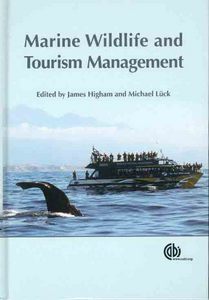Marine wildlife tours: benefits for participants
Zeppel, H., and Muloin, S. (2008) Marine wildlife tours: benefits for participants. In: Higham, James, and Luck, Michael, (eds.) Marine Wildlife and Tourism Management. CABI, Wallingford, Oxfordshire, UK, pp. 19-48.
![[img]](https://researchonline.jcu.edu.au/7430/1.hassmallThumbnailVersion/7430_Cover.jpg)
|
Image (JPEG) (Book Cover)
- Cover Image
Download (36kB) |
|
|
PDF (Published Version)
- Published Version
Restricted to Repository staff only |
Abstract
This publication does not have an abstract. The introduction is displayed as the abstract.
Wildlife-based tours in marine and coastal areas provide a range of psychological, educational and conservation benefits for visitors encountering marine animals (Higham, 1998; Drams, 2000; Schanzel and Mclntosh, 2000; Luck, 2003; Flnkler and Higham, 2004; Mayes et al.,2004; Hughes and Saunders, 2005; Tisdell and Wilson, 2005; Andersen and Miller, 2006). This chapter reviews and evaluates benefits for participants on marine wildlife tours. The focus is on non-consumptlve, free-ranging marine wildlife tourism where visitors can view, photograph, feed, and swim with, or assist in research on, marine animals in their natural habitats. Other broader participants include the marine tour operators, coastal and island communities in marine areas and researchers studying marine wildlife and/or tourists. Most research on marine wildlife tourism addresses environmental impacts on sea animals, industry compliance with codes of conduct and managing visitor interactions with marine species. However, this chapter reviews studies that primarily focus on tourist experiences of marine and coastal wildlife in Australia, New Zealand, Scotland and western Canada/USA. Much of this research on marine wildlife tourism is site or species specific and limited to one type of encounter. There is a need for more systematic, in-depth evaluation of marine wildlife tourism experiences and educational programmes to identify techniques that increase tourist benefits and knowledge, promoting attitude shifts and lifestyle changes (Samuels et al., 2003). In addition, both on-site and longer-term conservation behaviours that benefit marine wildlife and marine environments need to be explored. This chapter introduces marine wildlife tours and visitor benefits from marine wildlife encounters, then critically reviews the psychological, educational and conservation benefits of tourist participation in a range of marine wildlife experiences.
| Item ID: | 7430 |
|---|---|
| Item Type: | Book Chapter (Research - B1) |
| ISBN: | 978-1-84593-345-6 |
| Keywords: | marine wildlife tourism; education benefits; psychological benefits; conservation benefits |
| Related URLs: | |
| Date Deposited: | 14 Jan 2010 23:46 |
| FoR Codes: | 15 COMMERCE, MANAGEMENT, TOURISM AND SERVICES > 1506 Tourism > 150606 Tourist Behaviour and Visitor Experience @ 60% 15 COMMERCE, MANAGEMENT, TOURISM AND SERVICES > 1506 Tourism > 150601 Impacts of Tourism @ 40% |
| SEO Codes: | 90 COMMERCIAL SERVICES AND TOURISM > 9003 Tourism > 900399 Tourism not elsewhere classified @ 100% |
| Downloads: |
Total: 325 Last 12 Months: 2 |
| More Statistics |



